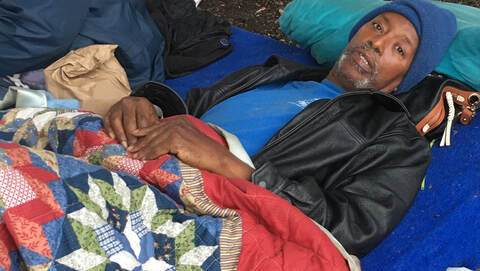|
May 7, 2020 update
I am Christina Fulsom, founder and CEO of East Texas Human Needs Network (ETHNN). ETHNN began 7 years ago and has over 100 social service and nonprofit partners in East Texas. I want to tell you about life in poverty and one of its worst outcomes, homelessness. Most of us can’t wait for life to return to normal, in poverty, "normal" is living in the tyranny of the moment. The coronavirus affects the impoverished in harsher ways than those with resources and stability. If you were already in an unstable environment, the pandemic just made it worse. Those experiencing homelessness and individuals and families living in poverty, are and should be recognized as a high-risk population during a pandemic. A lack of resources makes it difficult, if not impossible, to follow the most basic guidelines to slow the spread of COVID-19. These barriers are rarely considered when guidelines are written by well-intentioned middle class and wealthy policymakers. You can’t wash your hands for 20 seconds when you don’t have running water or soap. You can’t practice social distancing to protect the elderly or those with pre-existing conditions when multiple generations live in a 700 sq. ft. house. You can’t stay at home when you don’t have a house. You can’t stay at home when you don’t have sick leave. You can’t stay at home when you don’t get paid when you don’t work. You can’t stay at home when you must rely on social services for food or medicine. When we don’t understand the world of poverty, the policies established miss an entire population that makes up 17% of our East Texas population. |
When we met this man and his wife, on April 6th, he was shivering on a mattress under a bridge in Tyler. Five days earlier, he had been discharged from a hospital stay for congestive heart failure, rheumatoid arthritis, and a spinal injury. A taxi had taken him home (under the bridge), a mattress just a half mile away from the hospital. Five days later, unable to walk and without a wheelchair, he had no medication, and no plans for follow-up care. Since entering isolation housing, he has a medical home and is taking medications to improve his wellbeing. We continue case management to ensure he is not released back to the streets. |
To be in poverty even during the best of times is a risk factor for chronic health conditions. Among the homeless populations there is a higher susceptibility to symptomatic infection, hospitalization, and fatality, not only due to age, but also the accelerated physical decline and mental weathering that frequently results from repeat exposure to harsh elements. This population is at greater risk of serious complications from a COVID-19 infection.
I am also concerned about the potential for widespread transmission of COVID-19 within the homeless population due to inadequate access to hygiene and sanitation and the difficulty of early detection among a population isolated from health care.
In January 2020, ETHNN conducted the Point in Time Homeless Survey and Count with guidance from Texas Homeless Network. We identified 325 individuals. It is estimated by HUD this could have as much as a 40% undercount. We know from this survey that at least 20% have underlying chronic health conditions.
On April 6, a small ETHNN team implemented a COVID-19 Homelessness Response to address the needs of homeless individuals and families. Isolation in a hotel room has become their temporary home. The program will end when the Stay at Home order is lifted and those in the temporary isolation housing have been transferred to other supportive services.
We screened using the CDC’s COVID-19 App. We visit known locations, encampments and meal sites, and receive referrals from nonprofit organizations like PATH and Salvation Army. As of May 5, 30 people have been placed in isolation housing. Their underlying health conditions include multiple sclerosis, congestive heart failure, kidney and heart disease, diabetes, hypertension, rheumatoid arthritis, major depression, suicidal ideation, asthma, brain tumor and pregnancy. Two of our residents have recently given birth and returned to isolation housing. We have two locations, one for protection to exposure and another for those exposed to COVID-19.
I am also concerned about the potential for widespread transmission of COVID-19 within the homeless population due to inadequate access to hygiene and sanitation and the difficulty of early detection among a population isolated from health care.
In January 2020, ETHNN conducted the Point in Time Homeless Survey and Count with guidance from Texas Homeless Network. We identified 325 individuals. It is estimated by HUD this could have as much as a 40% undercount. We know from this survey that at least 20% have underlying chronic health conditions.
On April 6, a small ETHNN team implemented a COVID-19 Homelessness Response to address the needs of homeless individuals and families. Isolation in a hotel room has become their temporary home. The program will end when the Stay at Home order is lifted and those in the temporary isolation housing have been transferred to other supportive services.
We screened using the CDC’s COVID-19 App. We visit known locations, encampments and meal sites, and receive referrals from nonprofit organizations like PATH and Salvation Army. As of May 5, 30 people have been placed in isolation housing. Their underlying health conditions include multiple sclerosis, congestive heart failure, kidney and heart disease, diabetes, hypertension, rheumatoid arthritis, major depression, suicidal ideation, asthma, brain tumor and pregnancy. Two of our residents have recently given birth and returned to isolation housing. We have two locations, one for protection to exposure and another for those exposed to COVID-19.
We are providing intensive case management. We feed, counsel and provide medical care, medication, medical equipment, clothing, benefits services, transportation, housing placement and more. Residents are asked to stay in their rooms and not have visitors. We’ve set up an office at each hotel and interact with each resident daily.
Everyone we offered housing to accepted it. We’ve seen in a short period of time that housing with supportive services have given individuals peace and perspective with which to begin addressing their complex challenges. Still, for many , the conversation now is, “What happens when we can’t stay here anymore, what are we going to do?” We are working with them and our community partners to develop exit plans.
For those experiencing homelessness who did not need isolation housing, we provided COVID-19 education, masks, and a hand-washing station, Gateway to Hope and the Salvation Army of Tyler are providing showers, and multiple ministries are providing meals.
The ETHNN Homeless Response Team includes Mercy Works, PATH, Samaritan Counseling Center, Goodwill, St. Paul Children’s Clinic, Family Circle of Care, Tyler Cab, WIC, Nurse Family Partnership, The Salvation Army of Tyler, Gateway to Hope, and Prime Time Laundry. We could not have developed and implemented this program so quickly if it wasn’t for the relationships we’ve developed in the last seven years. There are gaps in our continuum of care, together we will develop a permanent program to address these needs.
These organizations are among our first responders. Whether non-profit or faith-based they are stepping up. They have changed how they operate ensuring they are protecting themselves while continuing to serve their community. As you might imagine, these organizations, that rely heavily on volunteers, in-kind, and monetary donations are struggling. Most volunteers are older and must stay at home, some are young parents who also must stay at home. Working together, we are providing an environment where body and soul have a place and a little time to heal.
My hope is that there is a recognition and understanding that the barriers for people who live in poverty or who face homelessness are tremendously challenging. As a society, we need to take care of each other. We need to reduce the bias, the judgement and the blaming. We need to understand that every person has worth.
Everyone we offered housing to accepted it. We’ve seen in a short period of time that housing with supportive services have given individuals peace and perspective with which to begin addressing their complex challenges. Still, for many , the conversation now is, “What happens when we can’t stay here anymore, what are we going to do?” We are working with them and our community partners to develop exit plans.
For those experiencing homelessness who did not need isolation housing, we provided COVID-19 education, masks, and a hand-washing station, Gateway to Hope and the Salvation Army of Tyler are providing showers, and multiple ministries are providing meals.
The ETHNN Homeless Response Team includes Mercy Works, PATH, Samaritan Counseling Center, Goodwill, St. Paul Children’s Clinic, Family Circle of Care, Tyler Cab, WIC, Nurse Family Partnership, The Salvation Army of Tyler, Gateway to Hope, and Prime Time Laundry. We could not have developed and implemented this program so quickly if it wasn’t for the relationships we’ve developed in the last seven years. There are gaps in our continuum of care, together we will develop a permanent program to address these needs.
These organizations are among our first responders. Whether non-profit or faith-based they are stepping up. They have changed how they operate ensuring they are protecting themselves while continuing to serve their community. As you might imagine, these organizations, that rely heavily on volunteers, in-kind, and monetary donations are struggling. Most volunteers are older and must stay at home, some are young parents who also must stay at home. Working together, we are providing an environment where body and soul have a place and a little time to heal.
My hope is that there is a recognition and understanding that the barriers for people who live in poverty or who face homelessness are tremendously challenging. As a society, we need to take care of each other. We need to reduce the bias, the judgement and the blaming. We need to understand that every person has worth.



